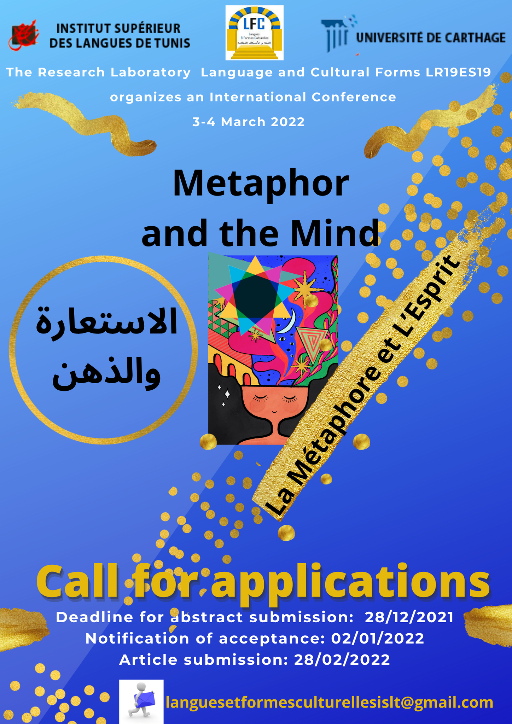
Metaphor has a number of different roles in language: a semantic role in creating new meanings for words, a cognitive role in developing our understanding on the basis of analogy and a pragmatic role that aims to provide evaluations. These interconnecting aspects of metaphor imply that it is a complex area of enquiry. (Charteris-Black, 2004: 24)
Metaphor is tightly linked to the mind from various perspectives. On the one hand, metaphor is about the transfer of meanings. The term finds roots in the Greek word meta-pherin meaning to transfer or carry across. Metaphors carry meaning from one word, image, idea, or situation to another. (www.merriam-webster.com.). On the other hand, the mind is perceived as a connecting organ. This implies that the event of carrying meaning from one thing to another is intertwined with the principle of assembling putting two things together. However, the ways in which things are connected is dependent on context and intention (Richards, 1925).
Within the realm of Greek thought, Aristotle considers metaphor as a “theory of argumentation”. He even claims that metaphor is “a sign of genius” (Kennedy, 1991 trans). Because of its heuristic function, metaphor stimulates new ways of understanding and is relative to creative thinking. Not only does it permit the human brain finding the similar in the dissimilar (Charteris-Black, 2004), but it also serves creating a fresh world view (Semino, 2008). Metaphor is then an instrument for decoding and encoding new meanings and consequently new knowledge. Further, Lakoff and Johnson claim that metaphors are not of a matter of peripheral interest but are central to the human functioning in the world (1980). They argue that it is the neural connections resulting from our bodily experience (BE) that explain metaphors. Nonetheless, the embodiment hypothesis has been regarded as a form of reductionism since the body is a historical and a cultural entity next to being biological (Goatly, 2007). Given that Lakoff and Johnson introduced the theory in de-contextualized items, some scholars proposed adding the pragmatic dimension developed by Ricoeur. They suggested bringing metaphor to the field of rhetoric initiated by Aristotle, too. Based on the idea that metaphor ties together the external environment, the neural connections, and the linguistic forms, it requires a multi-dimensional approach (Charteris-Black, 2004). Since metaphor has been utilized by all authority holders including politicians, journalists, and academic authorities, it has become an expansive research topic. In this sense, it essentially treats the discourse of power (Foucault—power / knowledge, Habermas—the public sphere, Fairclough and Van-Dijk —CDA). The results of the work of these scholars revealed that metaphors have a binary function: they target persuasion and involve manipulation. Alternatively, certain linguists suggest metaphors that aim at the well-being of Man. In this respect, Goatly (2007: 5) claims that: The favourite metaphors of capitalism are metaphors of COMETITION and WAR, QUALITY and QUANTITY AS WEALTH. [Alternatively, I propose] metaphors which represent humans, not only as competitive animals, but as involved productive and co-operative relationships: social organizations as buildings or the human body relationships as music.
The conference seeks to delve into this variety of issues by triggering a better awareness of the inter-connectedness between metaphor and the mind. The ultimate objective is to aid the acting out of these “positive metaphors”, to use the terms of “Goatly”. It is within this framework that the organizing committee welcomes individual and panel proposals related, but not limited to the following topics:
1/ Metaphor in Language and Thought
§ Re-visiting the Classical Theory of Metaphor
§ Meaning-making in language and thought
§ Re-viewing CMT
2/ Metaphor in Discourse
§ Metaphor and context
§ Metaphor and Critical Discourse Analysis (CDA)
§ The impact of metaphor
3/ Metaphor and the Power of Language
§ Metaphor in public discourse
§ Metaphor, manipulation and persuasion
§ Metaphor and directing the minds
4/ Metaphor and Social Cognition
§ Conventional metaphor Vs creative metaphor
§ Universal metaphors and cultural commonality
§ The role of metaphor in the construction of beliefs and ideologies
5/ Metaphor in Scientific Discourse
§ -How literal is scientific discourse?
6/ Translation in the Face of Metaphor
§ Re-visiting metaphor translation procedures
Conference days and venue: March, 3-4, 2022 at the Higher Institute of Languages, Tunis (ISLT) and/or online (depending on the sanitary situation of the country)
Abstracts of no more than 250 words (typed in Times New Roman size 14) are accepted in Arabic, French and English.
Applicants are invited to submit proposals and participation forms no later than 02 of January 2022 to the following address : languesetformesculturellesislt@gmail.com